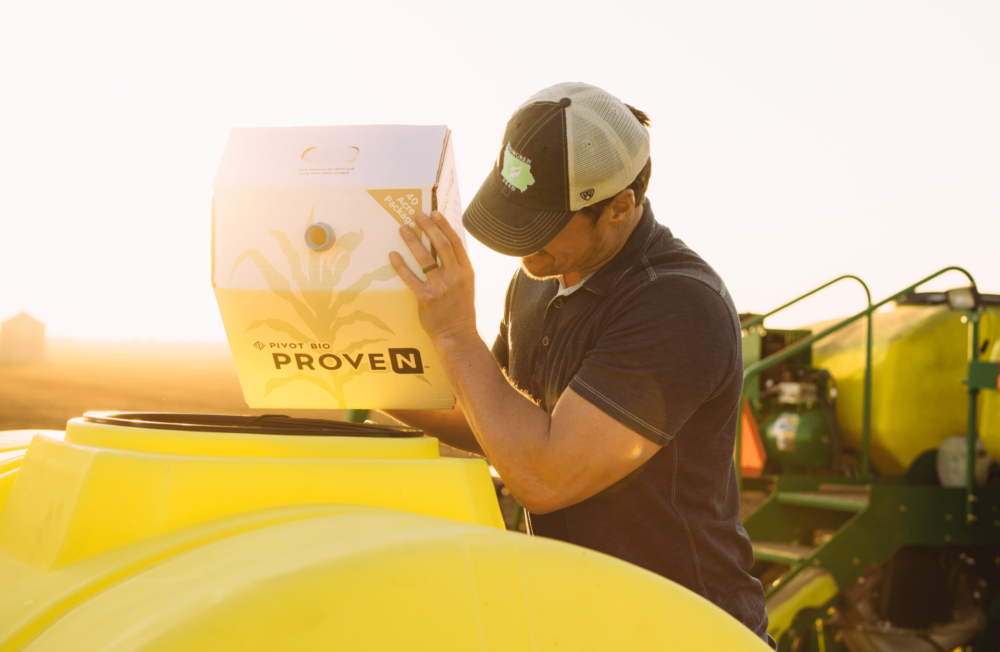- Growers replaced synthetic nitrogen on 725,000 acres and avoided more than 80,000 metric tons of CO2 equivalent, according to the results of Pivot Bio‘s 2022 N-OVATOR pilot program and its 2023 expansion.
- N-OVATOR is for growers using Pivot Bio’s microbe-based nitrogen-fixing product to replace synthetic nitrogen and reduce on-farm emissions.
- In 2023, the program has expanded beyond a pilot and is open to all Pivot Bio customers for the first time.
‘It was meant to be a small pilot’
Pivot Bio launched the N-OVATOR pilot in 2022, hoping to capture results from small subset of its customers using Proven 40, the company’s nitrogen-fixing microbe product for corn.
The program results, not to mention enthusiasm from growers, were far beyond initial expectations, says Pivot:
- Currently, Proven 40 replaces about 20% of a customer’s synthetic nitrogen.
- Growers replaced 36 pounds of synthetic fertilizer per acre on average without impacting yield.
- Across the program, participants replaced synthetic nitrogen on a total of 725,000 acres, avoiding more than 80,000 metric tons of CO2e — roughly the same amount of CO2e generated by annual electricity use in 15,000 homes.
- N-OVATOR participants replaced nearly 12,000 tons of synthetic fertilizer. Pivot says this is the largest reduction of its kind ever recorded.
- Pivot’s microbes were used on more than 3 million acres of U.S. cropland in 2022, a 300% year-over-year growth for the second year in a row.
The program very quickly transitioned from a small task force to something the company is commercializing at a large scale in 2023.
“This was meant to be a small pilot,” Pivot Bio’s Mitchell Craft tells AFN. “We were not planning on it becoming a commercial-scale sustainability program that captured this kind of impact.”
‘Growers want to get out of synthetic nitrogen’
There are 91 million acres of corn in the US, the vast majority of which gets treated with synthetic nitrogen.
But Craft says the success of N-OVATOR “goes to show the growers want to get out of synthetic nitrogen. They recognize that it causes harm to the environment.”
It’s estimated that nearly half of all nitrogen fertilizer applied to crops is lost because of improper application, over-application, poor timing and other factors. Runoff can carry this excess nitrogen away, polluting waterways and aquatic ecosystems. See the Gulf of Mexico’s “Dead Zone” as an example of the consequences of excess nitrogen.
Growers would like to circumvent this pollution with alternatives to synthetic nitrogen, but they realistically can only do so if they can also maintain yield and perhaps even realize ROI, says Craft. “And we have the technology that can provide them with the pathway to do that.”
“Every time we talked to a grower, they talked about being stewards of the land and wanting to protect it. We’re trying to provide alternative revenue streams that improve growers’ ROI, revenues and livelihoods while also providing environmental benefits.”
Right now, Proven 40 replaces about 20% of a grower’s synthetic nitrogen, he says. Pivot Bio is continuing to develop its product to improve efficacy and help farmers reduce more synthetic nitrogen.
“As we scale, these reductions will scale. They’re going to become very significant very quickly as our product adoption scales and more growers [join] the N-OVATOR program.”
Part of Proven 40’s appeal is its “plug-and-play” nature, says Craft. Growers don’t have to change much in order to implement the product, which is available as on-seed or in-furrow.
The products benefits can also expand beyond the farm gate, potentially helping growers customers reduce emissions. For agrifood corporates under pressure to reduce Scope 3 emissions, this is an especially hot-button issue right now.
“We’re working on corn, which is the foundation of the economy in so many ways,” says Craft. “The reductions and emissions that happen on the farm are going to trickle through to all the different players in that value chain. That provides us with with an incredible opportunity to also capture those sustainability benefits and bring them back to the growers.”
Input prices in 2022 were ‘an anomaly’
Last year saw skyrocketing costs for farm inputs. A McKinsey survey found that 80% of farmers cited cost as the biggest threat to profitability — and one of the biggest drivers for turning to alternatives.
Price was “definitely a tailwind” for the program in 2022, says Craft, but this was “an anomaly” that Pivot Bio doesn’t plan to rely on.
“We want to provide predictability to growers, so they know that when they’re buying nitrogen, that nitrogen is going into the plant. That’s why folks have adopted the product so quickly — they’re just seeing the performance.
It’s not necessarily a huge yield bump. What we’re delivering is yield parity while synthetic [nitrogen] is reduced.”
But, he adds, “there’s a massive ROI and it’s safer.”
“Looking ahead to next year, we’re expecting hundreds more growers, millions of acres. We’re really excited to see what’s going to come from this program as the product takes off.”





